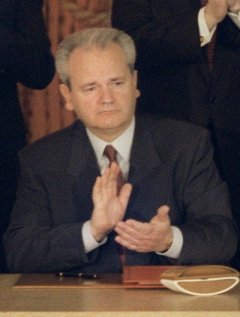 This decision comes ten years after Milosevic was assassinated in the ICTY prison. He was poisoned.
This decision comes ten years after Milosevic was assassinated in the ICTY prison. He was poisoned.
The ICTY is complicit in his death.
The distinguished judges are not only responsible for the death of Slobodan Milosevic, they are responsible for “legalizing” an illegal invasion of a sovereign country as well as covering up the most heinous crimes committed by US-NATO against the former Republic of Yugoslavia.
At the outset of Milosevic’s defense, the ICTY denied him the fundamental right of self defense and appointed two bogus British amicus curiae. The latter were appointed without the consent of the defendant.
Milosevic was also denied medical treatment while in detention.
Michel Chossudovsky, Global Research Editor, August 3, 2016
The International Criminal Tribunal for the Former Yugoslavia (ICTY) in The Hague has determined that the late Serbian president Slobodan Milosevic was not responsible for war crimes committed during the 1992-95 Bosnian war.
In a stunning ruling, the trial chamber that convicted former Bosnian-Serb president Radovan Karadzic of war crimes and sentenced him to 40 years in prison, unanimously concluded that Slobodan Milosevic was not part of a “joint criminal enterprise” to victimize Muslims and Croats during the Bosnian war.
The March 24th Karadzic judgment states that “the Chamber is not satisfied that there was sufficient evidence presented in this case to find that Slobodan Milosevic agreed with the common plan” to permanently remove Bosnian Muslims and Bosnian Croats from Bosnian Serb claimed territory.
The Karadzic trial chamber found that “the relationship between Milosevic and the Accused had deteriorated beginning in 1992; by 1994, they no longer agreed on a course of action to be taken. Furthermore, beginning as early as March 1992, there was apparent discord between the Accused and Milosevic in meetings with international representatives, during which Milosevic and other Serbian leaders openly criticised Bosnian Serb leaders of committing ‘crimes against humanity’ and ‘ethnic cleansing’ and the war for their own purposes.”
The judges noted that Slobodan Milosevic and Radovan Karadzic both favored the preservation of Yugoslavia and that Milosevic was initially supportive, but that their views diverged over time. The judgment states that “from 1990 and into mid-1991, the political objective of the Accused and the Bosnian Serb leadership was to preserve Yugoslavia and to prevent the separation or independence of BiH, which would result in a separation of Bosnian Serbs from Serbia; the Chamber notes that Slobodan Milosevic endorsed this objective and spoke against the independence of BiH.”
The Chamber found that “the declaration of sovereignty by the SRBiH Assembly in the absence of the Bosnian Serb delegates on 15 October 1991, escalated the situation,” but that Milosevic was not on board with the establishment of Republika Srpska in response. The judgment says that “Slobodan Milosevic was attempting to take a more cautious approach”